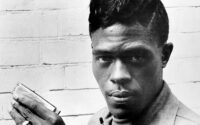Lead Belly
A Powerful Voice in American Music 🎵
Huddie William Ledbetter, better known by his stage name Lead Belly, was a towering figure in American music history. From his powerful vocals and virtuosity on the twelve-string guitar to the vast repertoire of folk, blues, and gospel he introduced, Lead Belly’s influence continues to resonate today.
Born in Louisiana in 1888 (though the exact date is debated), Lead Belly’s musical journey began in his youth. He received his first instrument, an accordion, from his uncle, and by his early twenties, he was a seasoned guitarist and occasional laborer. Performing in Shreveport’s notorious red-light district, Lead Belly honed his unique style, drawing influences from the city’s vibrant musical scene.
Lead Belly’s life was marked by periods of incarceration, starting in 1915. During a stint in a Texas prison in 1930, folklorists John and Alan Lomax discovered him. Deeply impressed by Lead Belly’s extensive repertoire and powerful voice, the Lomaxes recorded him in 1933, forever altering his life’s trajectory.
Released in 1934, Lead Belly’s recordings brought him national attention. Songs like “Goodnight, Irene” and “Midnight Special” became folk standards, while his powerful stage presence captivated audiences. Despite his success, financial struggles persisted, a common theme for many performers at the time.
Lead Belly’s impact transcended genres and generations. He collaborated with other folk icons like Woody Guthrie and Pete Seeger, influencing the burgeoning folk revival movement. Modern rock artists like Kurt Cobain and Bob Dylan credit Lead Belly as a pivotal influence, introducing his music to new audiences.
Lead Belly was a master of the twelve-string guitar, wielding his signature Stella with unmatched skill. His playing style, characterized by fingerpicking and intricate bass lines, drew inspiration from sources like barrelhouse piano and the Mexican Bajo Sexto. His vocals, often accompanied by a distinctive “haah” sound, added another layer of depth to his performances.
Lead Belly’s legacy extends far beyond his music. He is considered a crucial figure in preserving American folk traditions, documenting a vast repertoire of songs passed down through generations. His work continues to inspire musicians, scholars, and activists alike. From tributes at the Kennedy Center to Lead Belly Fest in London, his enduring influence is undeniable.
Lead Belly’s life was not without controversy. His multiple incarcerations stemmed from various charges, raising questions about racial bias in the justice system. The origin of his nickname “Lead Belly” also remains unclear, with various theories circulating.
One of Lead Belly’s most notable compositions, “The Titanic,” reflected his ability to capture current events in song. Inspired by the tragedy of 1912, the song also highlighted racial tensions of the era, referencing boxer Jack Johnson’s denied passage on a ship (though not the Titanic).
Lead Belly’s music addressed social issues as well. In his recording of “Scottsboro Boys,” he urged Black listeners to “stay woke,” a phrase believed to be one of the earliest documented uses of the term.
Lead Belly’s story is one of resilience, talent, and cultural significance. His powerful voice continues to echo through the halls of American music, reminding us of the enduring power of folk traditions and the importance of staying vigilant in the face of injustice.



